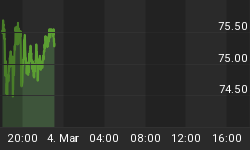Gold Hits Fresh Record vs. Geithner's "Strong Dollar" as S.African Mining Struggles
THE PRICE OF GOLD in US Dollars retreated from a fresh 0.7% surge early in London on Thursday, falling back from a new all-time record of $1123 an ounce as Asian stock markets closed the day lower.
Crude oil fell below $79 per barrel - higher by more than 75% from this time last year - while government bond prices rose.
The US Dollar bounced 1% from Wednesday's near-15 month low to the Euro.
Gold priced in both Euros and Sterling rose to fresh 8-month highs, hitting €748 and £677 an ounce respectively.
"Gold is way overbought short term," says Phil Smith at Reuters Technical India, but looking at trading volumes in the US Comex futures market, "the interesting thing to note it the big jump in volume that is powering this latest rally."
Thursday's new record gold price was the sixth in eight trading sessions vs. the Dollar.
"While Western governments continue to increase the debt on their balance sheets to pay for stimulus packages and bailouts," says the latest Precious Metals Monthly from Scotia Mocatta, "confidence in fiat currencies is likely to deteriorate, which in turn is likely to see demand for gold and other assets with intrinsic value remain high.
"Dips will remain well supported, as we see no near term, or medium term, solutions to the financial and economic problems that the West is experiencing."
CNNMoney today quotes Moody's Economy.com, leading think-tank the Brookings Institute, and the Center on Budget & Policy Priorities as all saying that the US government's latest stimulus package was too small.
Without extension, "The odds of sliding back into recession rises with the incredibly weak labor market," says Moody's Mark Zandi.
President Obama last week signed into law an extra 20 weeks of jobless benefits for unemployed Americans, and extended the $8,000 tax credit for new homebuyers to June 2010.
"A number of factors are driving the gold price rises at the moment," says Natalie Dempster, head of investment at marketing-group the World Gold Council, speaking to London's Independent today.
"Investors are of course using gold as a hedge against the weakening dollar and against concerns that central banks will not remove quantitative easing measures in time, which would lead to inflationary pressures."
US Treasury secretary Tim Geithner repeated his commitment to "a strong Dollar" during his visit to Tokyo on Wednesday.
"Gold prices have also been helped by central banks becoming net buyers," says Dempster. "China, Russia, and especially India, have reversed a trend where central banks have been sellers of gold for years."
Meantime in the gold mining sector, Aaron Regent - CEO of Barrick Mining since Jan. '09 - told the Financial Times that he had little choice but to raise $4 billion this fall to close out "hedge book" contracts obliging the world's No.1 miner to sell gold well below current prices.
Barrick's long-standing hedge book, begun during gold's 20-year bear market, including contracts to sell three million ounces of current production at around $400 per ounce - a loss of more than $600 an ounce.
"We would have had to do this now or later," Regent told the FT, because stock-market investors saw what the hedge book was doing to profits.
"They were not going to buy Barrick stock."
Speaking to Reuters, "We should be looking at record margins at a gold price now over $1100," said Barrick's chief financial officer Jamie Sokalsky, also attending Wednesday's RBC Gold Conference in London.
World No.3 gold miner AngloGold Ashanti meantime told investors that it expects the South African government to prevent a tripling of electricity prices by 2012.
"I do not believe the [state-owned] Eskom proposal will fly," said CEO Mark Cutifani at the RBC event, warning that simply doubling electricity prices would add 10% to AngloGold's cash costs per ounce of gold.
World No.5 producer Harmony Gold told the conference that it's planning to close "a couple" of low-grade, high-cost mines in South Africa, due to the Rand's ongoing rise vs. the US Dollar.
"With the costs you've got in underground operations, at [grades of] three grams per tonne, you battle to make ends meet," said CEO Graham Briggs, quoted by Creamer's MiningWeekly.
Formerly the world's top gold producing nation, South Africa saw its gold mining output fall 9.3% in Sept. compared with the same month last year, the official data agency saud today.
Now overtaken by China and the United States, South Africa's annual output has more than halved in the last decade.
Yesterday South Africa's National Union of Mineworkers warned the world's fourth-largest gold producing firm, Gold Fields, that 45,000 of its staff may strike over new recruiting, holiday and maternity leave policies.















